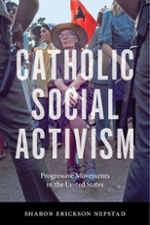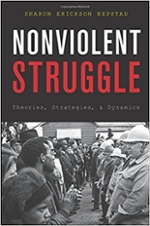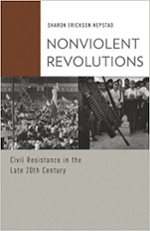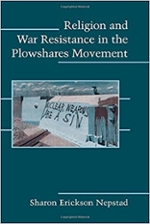Sharon Erickson Nepstad
Distinguished Professor

Associate Dean for Student Success, College of Arts and Sciences
- Email:
- nepstad@unm.edu
- Office:
- SSCI 1066
Education:
PhD, Sociology, University of Colorado (1996)
Research Interests:
Social Movements, Political Sociology, Sociology of Religion, Peace StudiesBooks:

On Revolutions: Unruly Politics in the Contemporary World
On Revolutions integrates insights from diverse fields—civil resistance studies, international relations, social movements, terrorism—to offes new ways of thinking about the study of revolution. Conventional lines of thought draw on a number of categorical distinctions: social versus political revolutions, structure versus agency, violent versus nonviolent strategies, domestic versus international factors, and success versus failure. In contrast, the book outlines an approach that reaches beyond these dichotomies. Revolutions are not just political or social—they feature many types of change. Structure and agency are not mutually distinct—they are mutually reinforcing processes. Contention is not just violent or nonviolent—it is a messy process that usually involves both strategies. Revolutions do not just succeed or fail—they achieve and simultaneously fall short. And causal conditions are not just domestic or international—they are dependent on the interplay of each. The merit of this approach is demonstrated through consideration of a wide range of cases. The volume also explores new opportunities for conceptual thinking about revolution, provides methodological advice, and engages with the ethical issues that exist at the nexus of scholarship and activism. Taken together, these innovations chart a new path for revolution studies.

Catholic Social Activism Progressive Movements in the United States
Many Americans assume that the Catholic Church is inherently conservative, based on its stances on abortion, contraception, and divorce. Yet there is a longstanding tradition of progressive Catholic movements in the United States that have addressed a variety of issues from labor, war, immigration, and environmental protection, to human rights, women’s rights, exploitive development practices, and bellicose foreign policies. These Catholic social movements have helped to shift the Church from an institution that had historically supported incumbent governments and political elites to a Church that has increasingly sided with the vulnerable and oppressed.
This book provides a concise history of progressively oriented Catholic Social Thought, which conveys the Catholic Church’s position on a variety of social justice concerns. Sharon Erickson Nepstad introduces key papal encyclicals and other church documents, showing how lay Catholics in the United States have put these ideas into practice through a creative and sometimes provocative political engagement. Nepstad also explores how these progressive movements have pressured the religious hierarchy to respond to pressing social issues, such as women’s ordination, conscription, and the morality of nuclear deterrence policies.
Catholic Social Activism vividly depicts how these progressive movements have helped to shape the religious landscape of the United States, and how they have provoked controversy and debate among Catholics and non-Catholics alike.
Available for purchase here.

Nonviolent Struggle: Theories, Strategies, and Dynamics
From Gandhi's movement to win Indian independence to the Arab Spring uprisings of 2011, an expanding number of citizens have used nonviolent action to win political goals. While such events have captured the public imagination, they have also generated a new surge of scholarly interest in the field of nonviolence and civil resistance studies. Although researchers have produced new empirical data, theories, and insights into the phenomenon of nonviolent struggle, the field is still quite unfamiliar to many students and scholars.
In Nonviolent Struggle: Theories, Strategies, and Dynamics, sociologist Sharon Nepstad provides a succinct introduction to the field of civil resistance studies, detailing its genesis, key concepts and debates, and a summary of empirical findings. Nepstad depicts the strategies and dynamics at play in nonviolent struggles, and analyzes the factors that shape the trajectory and outcome of civil resistance movements. The book draws on a vast array of historical examples, including the U.S. civil rights movement, the Indonesian uprising against President Suharto, the French Huguenot resistance during World War II, and Cesar Chavez's United Farm Workers. Nepstad describes both principled and pragmatic nonviolent traditions and explains various categories of nonviolent action, concluding with an assessment of areas for future research.
Available for purchase here.

Nonviolent Revolutions: Civil Resistance in the Late Twentieth Century
Winner of the 2012 Outstanding Book Award for the American Sociological Association, Section on Peace, War, and Social Conflict
In the spring of 1989, Chinese workers and students captured global attention as they occupied Tiananmen Square, demanded political change, and were tragically suppressed by the Chinese army. Months later, East German civilians rose up nonviolently, brought down the Berlin Wall, and dismantled their regime. Although both movements used tactics of civil resistance, their outcomes were different. Why?
In Nonviolent Revolutions, Sharon Erickson Nepstad examines these and other uprisings in Panama, Chile, Kenya, and the Philippines. Taking a comparative approach that includes both successful and failed cases of nonviolent resistance, Nepstad analyzes the effects of movements' strategies along with the counter-strategies regimes developed to retain power. She shows that a significant influence on revolutionary outcomes is security force defections, and explores the reasons why soldiers defect or remain loyal and the conditions that increase the likelihood of mutiny. She then examines the impact of international sanctions, finding that they can at times harm movements by generating new allies for authoritarian leaders or by shifting the locus of power from local civil resisters to international actors.
Available for purchase here.

Religion and War Resistance in the Plowshares Movement
Winner of the 2009 Outstanding Book Award for the American Sociological Association, Section on Peace, War, and Social Conflict
As the nuclear arms race exploded in the 1980s, a group of U.S. religious pacifists used radical nonviolence to intervene. Armed with hammers, they broke into military facilities to pound on missiles and pour blood on bombers, enacting the prophet Isaiah’s vision: “Nations shall beat their swords into plowshares and their spears into pruning hooks.” Calling themselves the Plowshares movement, these controversial activists received long prison sentences; nonetheless, their movement grew and expanded to Europe and Australia. In this book, Sharon Erickson Nepstad documents the emergence and international diffusion of this unique form of high-risk collective action. Drawing on in-depth interviews, original survey research, and archival data, Nepstad explains why some Plowshares groups have persisted over time while others have struggled or collapsed. Comparing the U.S. movement with less successful Plowshares groups overseas, Nepstad reveals how decisions about leadership, organization, retention, and cultural adaptations influence movements’ long-term trajectories.
Available for purchase here.

Convictions of the Soul: Religion, Culture and Agency in the Central America Solidarity Movement
Many U.S. Christians were profoundly moved by the liberation struggles in Central America in the 1980s. Most learned about the situation from missionaries who had worked in the area and witnessed the repression firsthand. These missionaries, Sharon Erickson Nepstad shows, employed the institutional and cultural resources of Christianity to seize the attention of American congregations and remind them of the moral obligations of their faith. Drawing on archival data and in-depth interviews with activists in ten separate solidarity organizations around the country, Nepstad offers a rich analysis of the experiences of religious leaders and church members in the solidarity movement. She explores the moral meaning of protest and the ways in which clergy used religious rituals, martyr stories, and biblical teachings to establish a link between faith and activism. She looks at the factors that transformed missionaries into skilled leaders who were able to translate the Central American conflicts into Christian themes and a religious language familiar to U.S. congregations. She also offers insights into the unique challenges of organizing on the transnational level and shows how the solidarity movement made U.S. policy towards Central America one of the most hotly contested issues in American politics during the 1980s. Unpacking the implications of her study for the field of collective action, Nepstad stresses the importance of the individual human agents who shape, and are shaped by, the structures and cultures in which they operate. She argues that working in and through the church gave supporters of solidarity moral credibility as well as a rich source of symbolic, human, and material resources that enabled them to reach across national boarders, motivating others to act upon their deeply held moral convictions. Shedding new light on the genesis and evolution of this important activist movement, Convictions of the Soul will be of interest to students and scholars of social movements, religion, and politics.
Available for purchase here.
Recent/Select Publications:
Nepstad, Sharon Erickson. 2023. “Toward an Agency-Centered, Iterative Approach to Social Movement Repression.” Sociology Compasshttps://doi.org/10.1111/soc4.13078
Setter, Davyd and Sharon Erickson Nepstad. 2022. “How Social Movements Influence Public Opinion on Political Violence: Attitude Shifts in the Aftermath of the George Floyd Protests.” Mobilization: An International Quarterly 27(4): 429–444. https://doi.org/10.17813/1086-671X-27-4-429
Nepstad, Sharon Erickson. 2021. “Religious Support for Civil Resistance Campaigns: When and How Does it Contribute to Regime Change?” Socius 7: 1-14. doi:10.1177/23780231211054997
Nepstad, Sharon Erickson. 2019. “Religion, Ideology, and Support for Nonviolent Revolutionary Struggles: A Comparison of Catholic Leaders in Argentina, Chile, and El Salvador in the 1970s-1980s.”Research in Social Movements, Conflict, and Change 43: 89-108.
Nepstad, Sharon Erickson and Alexis M. Kenney. 2018. “Legitimation Battles, Backfire Dynamics, and Tactical Persistence in the NFL Anthem Protests, 2016-2017.” Mobilization 23(4): 469-483.
Courses:
Social Movements
Sociology of Religion
Professional Writing & Publishing (graduate)
Qualitative Research Methods (graduate)
Social and Political Movements (graduate)
